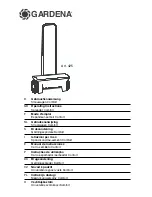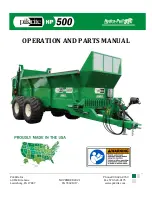
Calibration and discharging residual material
81
9
9
Calibration and discharging residual material
For precise control of the application rate, we recommend running a new calibra-
tion test every time you change fertiliser material types.
Carry out calibration:
Before spreading for the first time.
If the fertiliser quality has changed significantly (moisture, high dust content,
cracked grain).
If a new fertiliser type is used.
The calibration must be conducted with engaged PTO at a standstill or during
travel over a test track.
9.1
Determining the nominal output quantity
Calculate the nominal output quantity before starting the calibration test.
Calculating the exact forward speed
The exact forward speed must be known to calculate the nominal output volume.
1.
With a
semi-filled
machine, drive a distance of
100 m
on the field
.
2.
Stop the time required for this.
3.
The exact forward speed is indicated at the scale of the calibration test calcu-
lator.
Figure 9.1:
Scale for calculating the exact forward speed
NOTICE
With the
version
Q
machines, the calibration is carried out at the
QUANTRON
control unit.
The calibration is described in the separate operator's manual for the QUANTRON
control unit. This operator's manual is a component of the QUANTRON control unit.
Summary of Contents for MDS 8.2
Page 8: ...Intended use 1 2...
Page 28: ...Safety 3 22...
Page 38: ...Technical data 4 32...
Page 42: ...Axle load calculation 5 36...
Page 44: ...Transportation without tractor 6 38...
Page 86: ...Machine settings 8 80...
Page 96: ...Calibration and discharging residual material 9 90...
Page 110: ...Important information on spreading 10 104...
Page 114: ...Faults and possible causes 11 108...
Page 146: ......
















































